It’s no secret that children can be a handful. They’re curious, energetic, and sometimes downright mischievous. As a parent, it’s your job to help your child learn how to behave in a way that is acceptable in society. But how do you do that?
There are a lot of different approaches to child discipline, but the one that is most effective is based on psychology. By understanding how children think and learn, you can develop a discipline strategy that will help your child learn how to behave in a way that is acceptable to you and to society.
Key concepts of child discipline psychology:
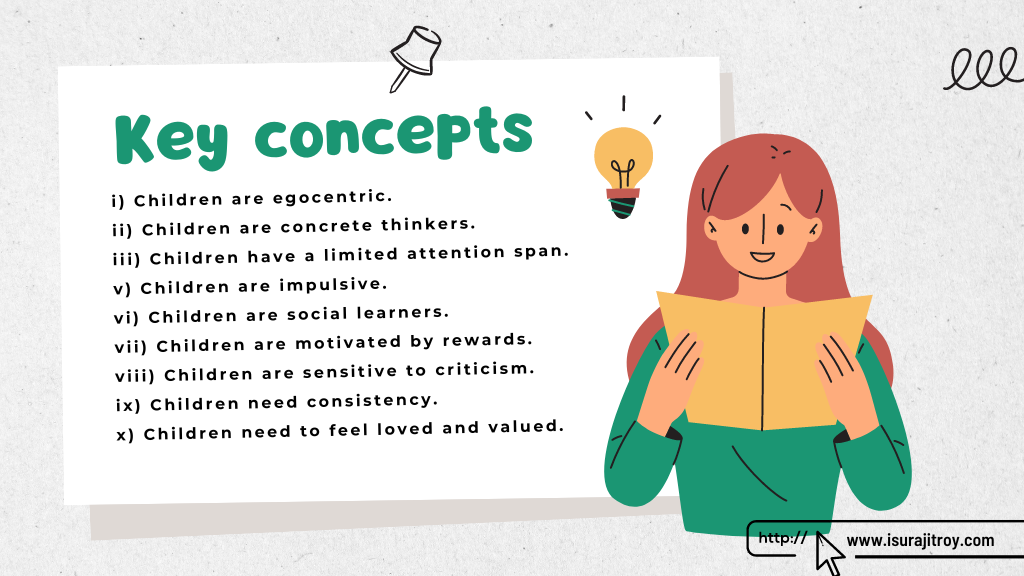
i) Children are egocentric.
This means that they see the world from their own perspective. They don’t yet have the ability to understand that other people have different points of view. This egocentricity can make it difficult for children to understand why they need to follow rules that they don’t agree with.
ii) Children are concrete thinkers.
This means that they tend to think in concrete terms rather than in abstract terms. They have difficulty understanding concepts that are not concrete. For example, they may not be able to understand the concept of time. This can make it difficult for them to understand why they need to wait their turn or why they need to do things in a certain order.
iii) Children have a limited attention span.
This means that they can only focus on one thing for a short period of time. This can make it difficult for them to pay attention to rules or instructions that are complex or that require them to pay attention for long periods of time.
iv) Children have a limited memory span.
This means that they can only remember a small amount of information at one time. This can make it difficult for them to remember all of the rules that they need to follow.
v) Children are impulsive.
This means that they tend to do things without thinking about the consequences. This can make it difficult for them to control their impulses and make good choices.
vi) Children are social learners.
This means that they learn by observing the behavior of others. This is why it’s so important for children to have positive role models in their lives. By seeing the positive consequences that come from following rules and behaving in a certain way, children are more likely to learn these behaviors themselves.
vii) Children are motivated by rewards.
This means that they are more likely to behave in a certain way if they are given a reward for doing so. This is why it’s important to use positive reinforcement when disciplining children. By giving them a reward for behaving in the way that you want them to, you are more likely to get them to repeat that behavior.
viii) Children are sensitive to criticism.
This means that they tend to take criticism personally. This can make it difficult for them to learn from their mistakes. It’s important to avoid criticism when disciplining children. Instead, focus on helping them to understand why their behavior was wrong and what they can do to improve it.
ix) Children need consistency.
This means that they need to know that the rules are always going to be the same. If the rules change all the time, children will have a difficult time understanding and following them. It’s important to be consistent when disciplining children. This doesn’t mean that you can’t be flexible, but it does mean that you need to be clear about the rules and expectations.
x) Children need to feel loved and valued.
This means that they need to know that they are loved and that their parents are proud of them. This can be a difficult concept for children to understand, but it’s important to remember that children need to feel loved and valued in order to be well-behaved.
1. What are the psychological effects on children when parents destroy their stuff as a punishment?
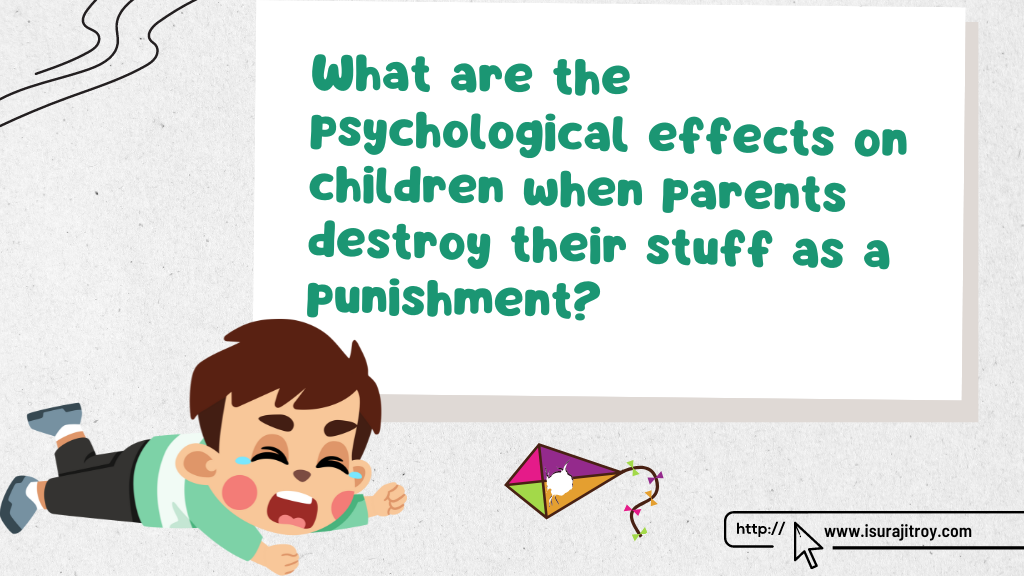
When parents destroy their children’s belongings as a punishment, the psychological effects can be profound. The child may feel that their belongings are not safe, and that their parents are not to be trusted. They may feel insecure and isolated, and may become withdrawn and depressed.
The child may also become angry and resentful, and may lash out at others. This can lead to further problems at school and in social situations. The child may also become obsessed with revenge, and may start to destroy other people’s belongings.
All of these psychological effects can have a negative impact on the child’s development, and can lead to further problems in later life. If you are a parent who is considering using this type of punishment, it is important to weigh up the potential risks and benefits before taking action.
2. How to discipline a narcissistic child?
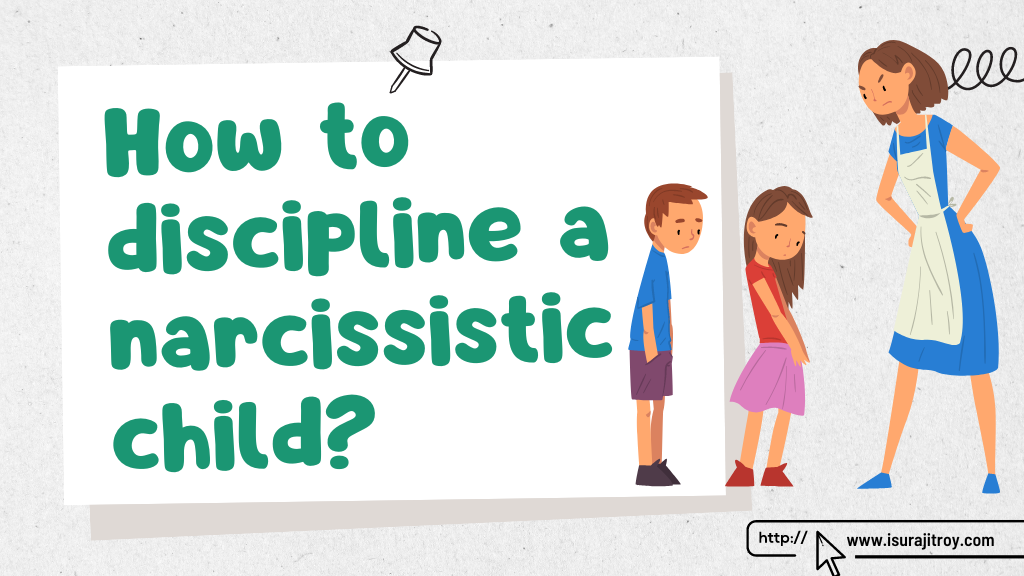
Narcissistic children can be a handful. They are usually charming, outgoing, and full of themselves. They also tend to be bossy, manipulative, and demanding. While it is important to encourage your child’s healthy self-esteem, it is also important to teach them to respect the rights and feelings of others. Here are some tips on how to discipline a narcissistic child:
i. Be consistent. Narcissistic children thrive on attention and will test your limits to see what they can get away with. It is important to be consistent with your expectations and rules. If you give in to their demands, they will only become more demanding.
ii. Be firm. When disciplining a narcissistic child, it is important to be firm. Do not give in to their demands or threats. Stick to your guns and they will eventually learn that they cannot always have their way.
iii. Be clear. When setting rules or expectations, be clear and concise. Make sure your child understands what is expected of them.
iv. Be calm. It is important to remain calm when disciplining a narcissistic child. They will try to push your buttons and get you angry, but if you lose your temper, they will have won.
v. Be positive. When praising your child, be sincere and specific. Avoid general comments such as “good job” or “great job.” Tell them what you liked about what they did and why it was good.
vi. Be negative. When correcting your child’s behavior, be sure to point out what they did wrong and why it was wrong. Avoid using labels such as “bad boy” or “naughty girl.”
vii. Be fair. When dealing with a narcissistic child, it is important to be fair. Do not let them get away with things just because they are charming or because you feel sorry for them.
viii. Be patient. Narcissistic children can be trying, but it is important to be patient. They will eventually learn the rules and boundaries if you are consistent and firm.
xi. Seek help. If you are having difficulty dealing with a narcissistic child, seek help from a professional. There are many books and articles available on the subject. You can also talk to your child’s teacher or doctor for advice.
3. How to discipline a high anxiety child?
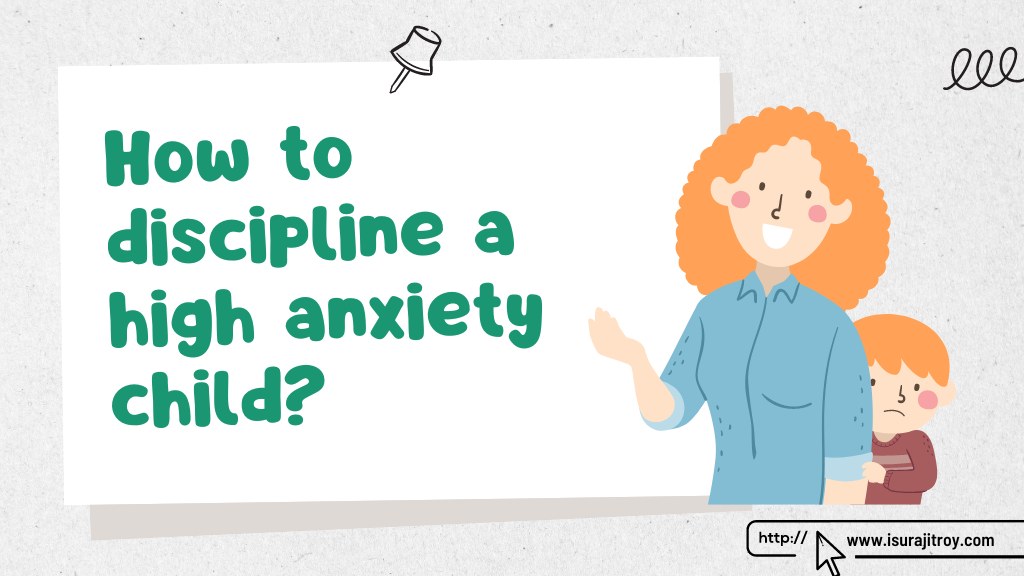
If your child has high anxiety, it can be difficult to know how to best support them. Here are a few tips on how to discipline a high anxiety child:
- Avoid using punishment as a form of discipline. Punishment can increase anxiety and cause your child to feel even more overwhelmed. Instead, focus on positive reinforcement and rewards for good behavior.
- Be consistent with your rules and expectations. Having a routine and stick to it will help your child feel more secure and less anxious.
- Avoid yelling or getting angry. This will only increase your child’s anxiety and make them feel more insecure.
- Try to be understanding and patient. It’s important to remember that your child is not acting out of spite or disobedience, but rather out of fear and anxiety.
- Seek professional help if your child’s anxiety is severe or if you feel like you’re struggling to cope. A therapist can help you and your child learn healthy coping skills and strategies to manage anxiety.
4. How to discipline a child with Asperger’s that won’t listen?
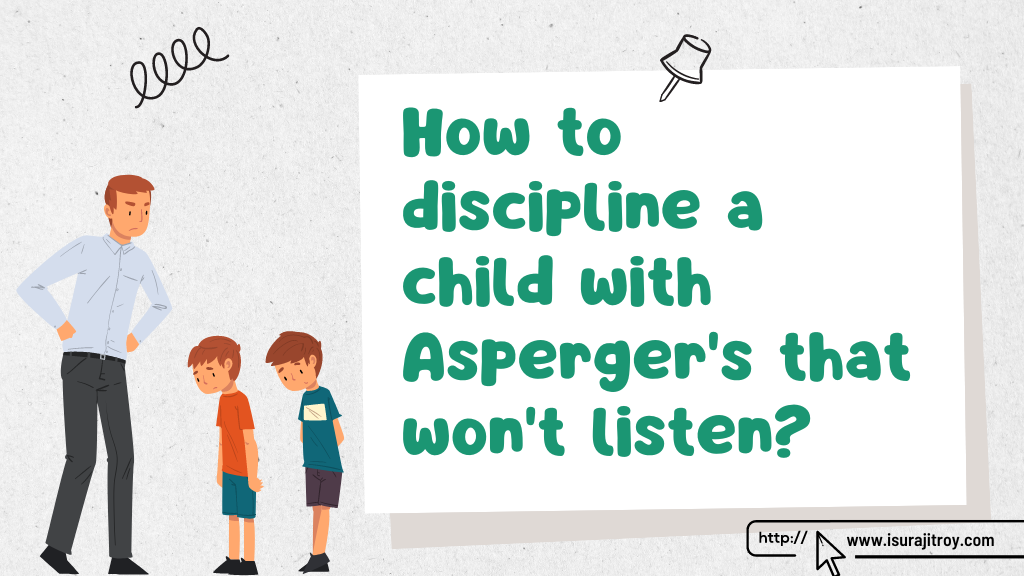
If you have a child with Asperger’s who is having difficulty listening and following directions, there are a few things you can do to help. First, it’s important to understand that children with Asperger’s often have difficulty understanding and processing verbal information. This means that they may not be able to understand what you’re saying, even if they are looking right at you. For this reason, it’s important to be as clear as possible when giving directions. Speak slowly and use simple language. Write down instructions if necessary.
Another thing to keep in mind is that children with Asperger’s often have trouble with executive functioning skills. This means that they may have difficulty with organization, planning, and self-regulation. As a result, it may be helpful to provide your child with visual aids to help them understand and follow directions. For example, you could use a picture schedule to show your child what tasks need to be completed in what order. Or you could use a token system to reward your child for completing tasks.
In addition to being clear and providing visual aids, it’s also important to be patient and understanding when disciplining a child with Asperger’s. Remember that they are likely doing the best they can. Avoid using punitive methods of discipline, such as yelling or spanking. Instead, focus on positive reinforcement. Reward your child for following directions and behaving appropriately. With time and patience, your child will learn how to listen and follow directions.
5. How to discipline a child with BPD?
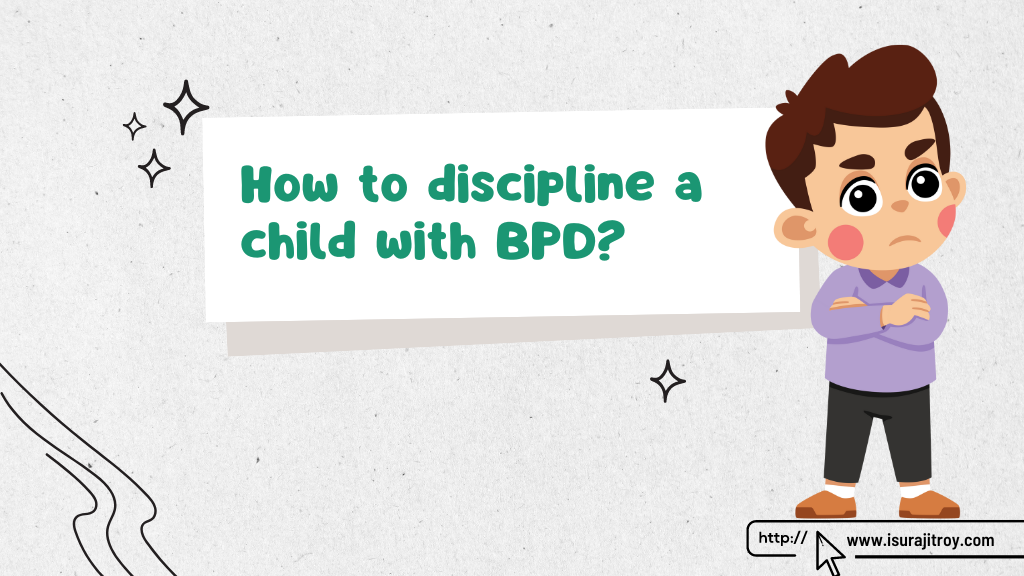
When it comes to disciplining a child with borderline personality disorder (BPD), it is important to keep in mind that these children are often very sensitive and react to things in a very intense way. Therefore, it is important to be consistent with the rules and expectations that you set for them, while also being understanding and patient. Here are a few tips on how to discipline a child with BPD:
i. Be consistent with the rules.
It is important to be clear and consistent with the rules that you set for your child. If you are inconsistent with the rules, it can be very confusing for a child with BPD and can lead to them feeling overwhelmed and out of control.
ii. Be understanding and patient.
Children with BPD are often very sensitive and react to things in a very intense way. Therefore, it is important to be understanding and patient with them.
iii. Avoid using punishment as a way to discipline.
Punishment can be very stressful for a child with BPD and can actually make their symptoms worse. Instead, focus on positive reinforcement and rewards for good behavior.
iv. Seek professional help.
If you are struggling to discipline your child with BPD, it is important to seek professional help. A therapist can help you develop a discipline plan that is tailored to your child’s individual needs.
6. How to discipline a child with a conduct disorder?
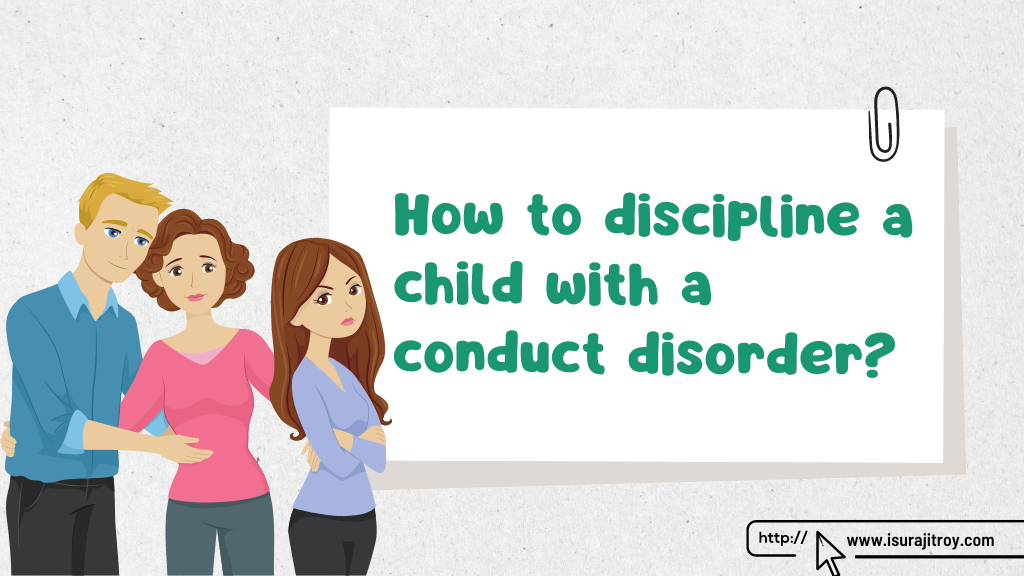
When it comes to disciplining a child with a conduct disorder, there is no one-size-fits-all approach. The best way to discipline a child with a conduct disorder will vary depending on the individual child and the severity of their disorder. However, there are some general tips that can help you create an effective discipline plan for a child with a conduct disorder.
i. Establish clear rules and expectations.
When disciplining a child with a conduct disorder, it is important to have clear rules and expectations in place. Make sure your child understands what is expected of them and what the consequences will be if they break the rules. It is also important to be consistent with your rules and expectations. If you allow your child to break the rules sometimes, they will start to expect that they can do so all the time.
ii. Use positive reinforcement.
When disciplining a child with a conduct disorder, it is important to use positive reinforcement. This means rewarding your child when they follow the rules and behave properly. This will help them to see that there are benefits to behaving correctly. Try to find creative ways to reward your child, such as giving them extra screen time or letting them choose what they have for dinner.
iii. Avoid using physical punishment.
When disciplining a child with a conduct disorder, it is important to avoid using physical punishment. This includes things like spanking, hitting, or shaking. Physical punishment can make a child’s behavior worse and can lead to them feeling more angry and aggressive. If you need to physically restrain your child, do so in a way that is safe and does not hurt them.
iv. Be calm and patient.
When disciplining a child with a conduct disorder, it is important to be calm and patient. This can be difficult, especially when your child is behaving badly. However, if you lose your temper, it will only make the situation worse. Try to take a deep breath and count to 10 before responding to your child’s bad behavior.
v. Seek professional help.
If you are struggling to discipline your child with a conduct disorder, seek professional help. There are many resources available to help you, such as support groups, counselors, and therapists. A professional can help you create an effective discipline plan and can provide guidance and support.
WANT TO SUPPORT MY EFFORT?


Hello Everyone!
As some of you may know, I am a blogger and I absolutely love it. I have been blogging for about two years now and I absolutely love it. I have been able to connect with so many people and I have also been able to help out other bloggers as well.
However, blogging does take up a lot of time and effort and it can be quite costly. I am currently in need of some financial assistance in order to keep my blog up and running. I would greatly appreciate any donations that you could give.
Thank you so much for your time and generosity!
7. How do you handle parents spanking their child inside your classroom?
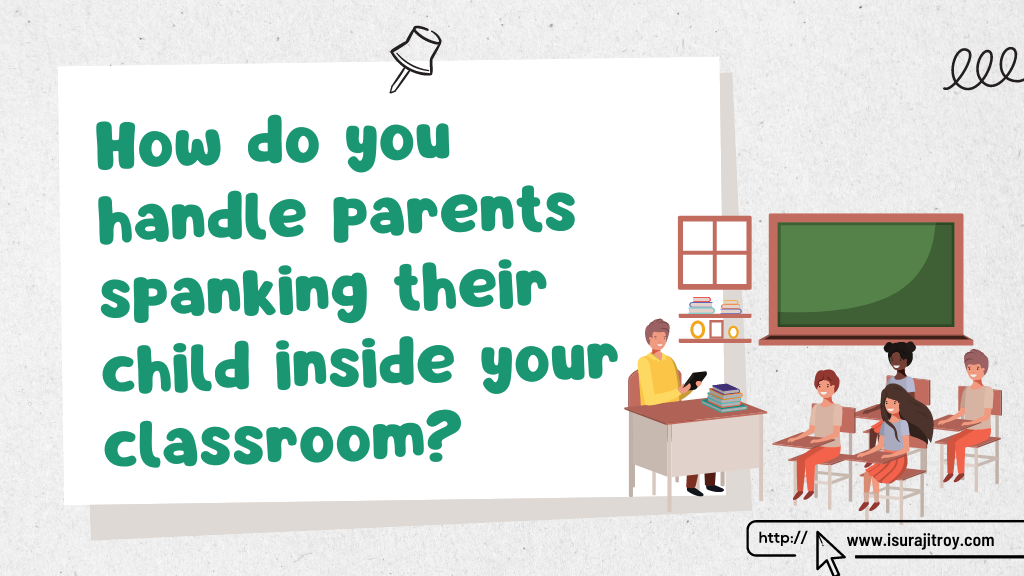
It can be difficult to handle parents spanking their child inside your classroom. Here are a few things to keep in mind:
- First and foremost, remember that you are the adult in the situation and the parent is likely acting out of frustration or anger. It is important to remain calm and collected.
- If possible, try to talk to the parent privately to discuss their concerns and why they feel the need to resort to physical discipline.
- If the parent persists in spanking the child, you may need to involve school administration or child protective services. It is important to document any incidents.
- In the meantime, do your best to create a safe and supportive environment for all students in your classroom. This means being extra patient and understanding with the child who is being spanked, as they are likely feeling scared and confused.
No matter how difficult it may be, it is important to stand up for what you believe is right. Children should not be subjected to physical violence, especially in a place that is supposed to be safe and nurturing.
8. Is it appropriate to discipline a child for something they did the day before?
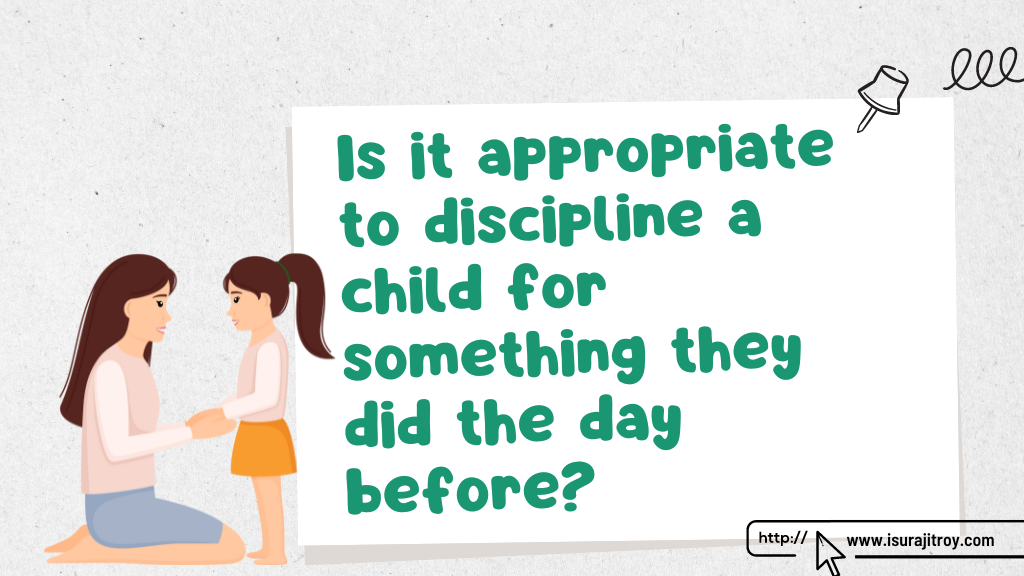
There is no easy answer to this question. It depends on the situation and the child’s age and maturity. Generally speaking, it is more appropriate to discipline a child for something they did the day before if it was a serious offense.
For example, if a child hits another child, it is more appropriate to discipline them for that behavior the following day so they understand that it is not acceptable. However, if a child simply forgot to do their homework the day before, it may be more appropriate to simply remind them of their responsibility and help them get back on track. Each situation is unique and must be handled accordingly.
09. How do I give my kids a spanking?
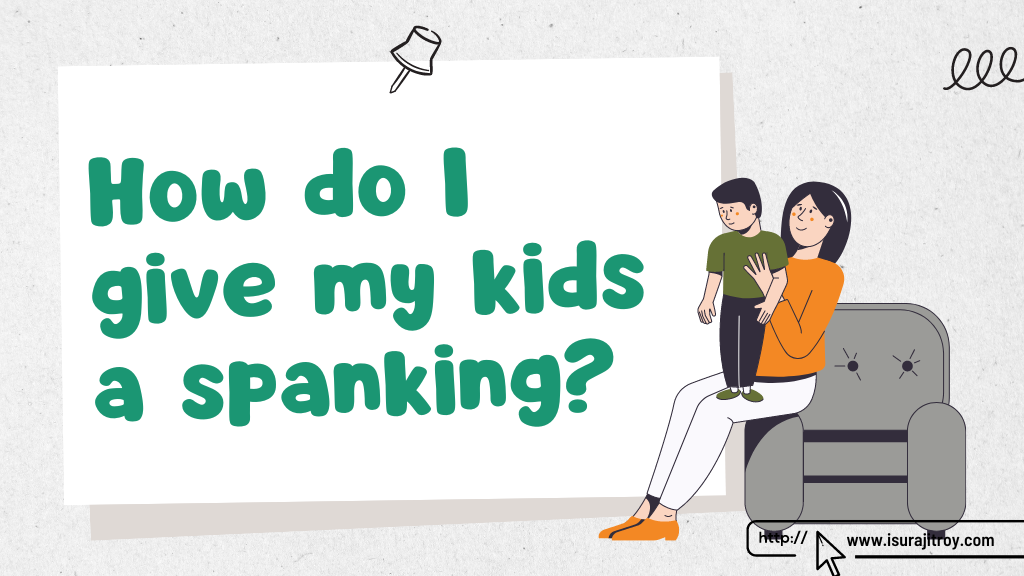
It’s a common question that parents ask, “How do I give my kids a spanking?” There are a few things to keep in mind when thinking about spanking as a form of discipline for your children.
First, you should consider your child’s age and developmental stage. It’s generally not appropriate to spank a child who is younger than 18 months old. For children 18 months to 4 years old, spanking should be used only as a last resort after other forms of discipline, such as time-outs, have failed. For older children, spanking can be an effective form of discipline if used properly.
Second, you should think about why you are spanking your child. Is it for a specific reason, such as hitting, biting, or throwing a tantrum? Or is it because you’re just angry and frustrated? If it’s the latter, then spanking is not the appropriate form of discipline.
Third, you need to be consistent with your discipline. If you only spank your child occasionally, they won’t understand why they’re being punished and it will be less effective. Likewise, if you spank your child too often, they will become desensitized to the punishment and it will lose its effectiveness.
Fourth, you need to make sure that you are spanking your child in a safe and appropriate manner. This means using an open hand to spank the child on the buttocks or legs, not hitting them with a closed fist or using an object such as a belt or paddle. You should also avoid spanking your child in anger, as this can lead to excessive force and injury.
Finally, you should always talk to your child after a spanking to explain why they were punished and what they need to do to avoid being spanked again in the future.
If you keep these things in mind, spanking can be an effective form of discipline for your children. Just make sure that you are using it appropriately and consistently.
10. What are the potential negative consequences for a child’s self esteem if a parent records their bad behavior on a cell phone?
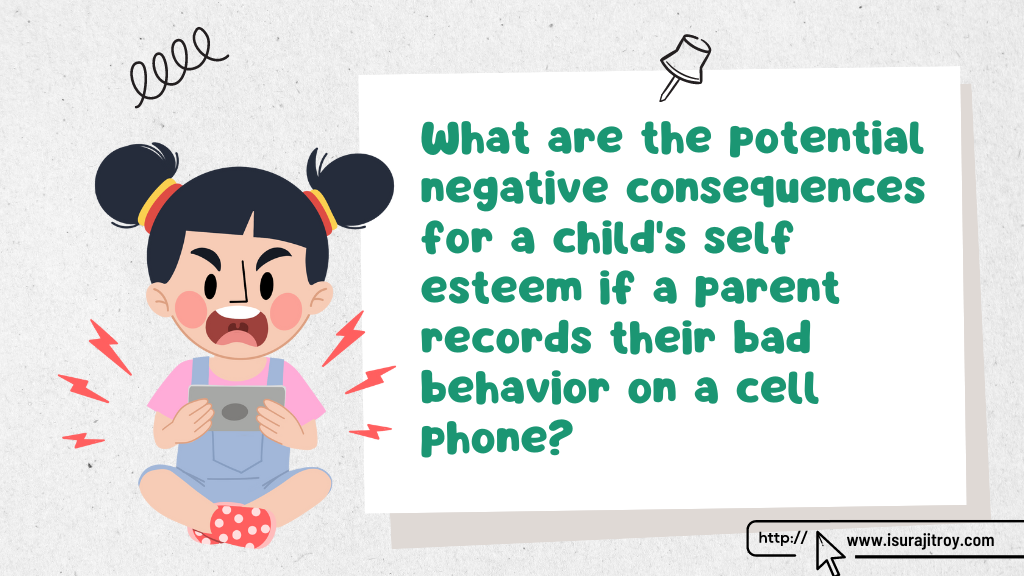
When it comes to disciplining children, parents have a lot of different options available to them. One of those options is to record their child’s bad behavior on a cell phone. While this may seem like a harmless way to document misbehavior, it can actually have a number of negative consequences for a child’s self esteem.
For one, it can make the child feel like they are being constantly monitored and evaluated. This can lead to feelings of insecurity and anxiety, as the child wonders when the next time they will be “caught” on camera. Additionally, it can give the child the message that their parents are more interested in punishing them than in helping them improve their behavior. This can damage the parent-child relationship and make the child feel like they are not worth their parents’ time and attention.
Finally, seeing themselves behaving badly on video can be a major blow to a child’s self-esteem. It can make them feel embarrassed, ashamed, and like they are not good enough. This can lead to a downward spiral of negative emotions andbehavior, making it even harder for the child to improve their behavior.
So, while recording a child’s bad behavior on a cell phone may seem like a harmless way to document it, it can actually have a number of negative consequences for a child’s self esteem. Parents should carefully consider whether or not this is a good option for them and their family.
11. Do any studies exist on the psychological health of parents who chose to adopt, particularly after the adopted child reaches adulthood?
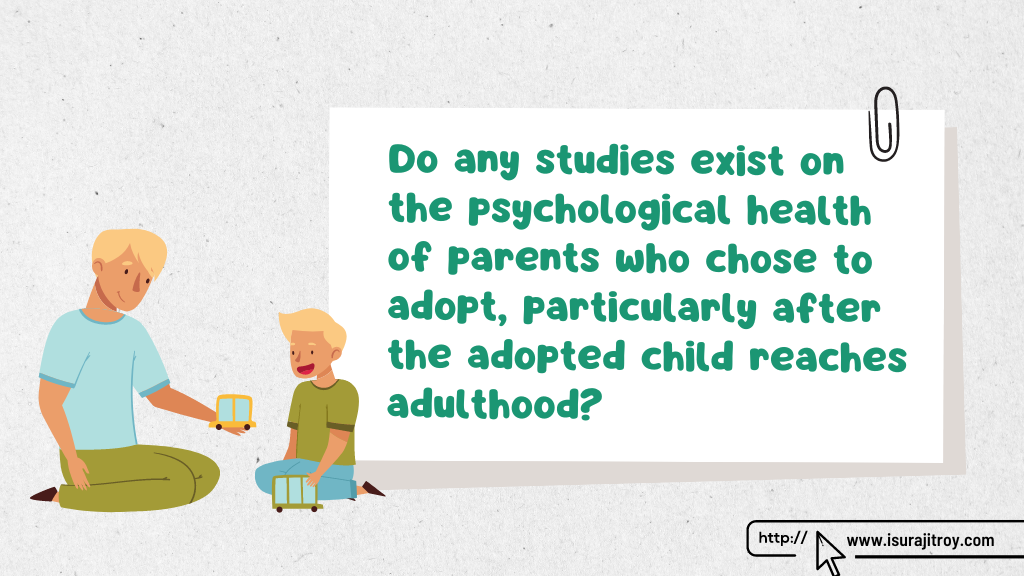
It’s a question that has been on the minds of many adoptive parents over the years: do any studies exist on the psychological health of parents who chose to adopt, particularly after the adopted child reaches adulthood? The answer, it turns out, is both yes and no.
There are a handful of studies that have been conducted on the psychological health of adoptive parents, but most of them are small in scope and don’t necessarily offer a comprehensive look at the issue. And while there are a few larger studies that have been done on the psychological health of parents who adopt later in life, none of them have focused specifically on the health of parents after their adopted children have reached adulthood.
So what does that mean for adoptive parents who are wondering about the psychological health of parents who adopt? Unfortunately, it means that there isn’t a clear answer. The studies that have been conducted on the topic offer a limited amount of information, and what information is available isn’t always easy to interpret.
That said, the few studies that have been done on the psychological health of adoptive parents do suggest that, on the whole, adoptive parents are generally psychologically healthy. One study found that adoptive parents are no more likely to experience depression than parents who don’t adopt, and another found that adoptive parents are actually less likely to experience anxiety than parents who don’t adopt.
So while there isn’t a ton of data on the psychological health of parents who adopt, what data is available suggests that adoptive parents are, on the whole, just as psychologically healthy as parents who don’t adopt. And that’s good news for adoptive parents who are wondering about the psychological health of parents who adopt.
12. Why do teenagers sometimes have serious psychological and psychotic behavior?
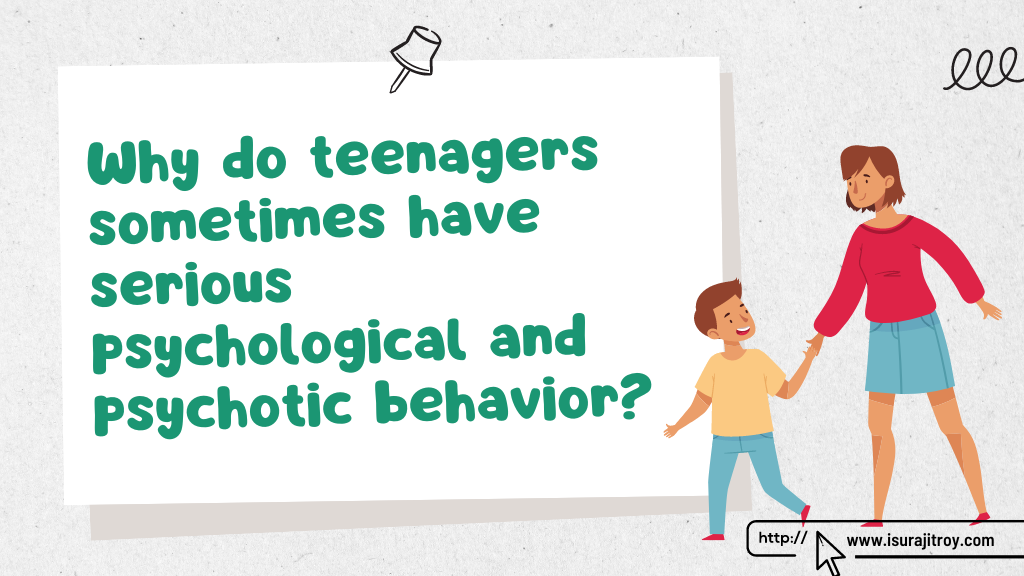
Psychosis is a mental disorder in which a person experiences a break from reality. Symptoms of psychosis can include hallucinations, delusions, and disordered thinking. Psychosis can occur in both teens and adults, but it is more common in teens.
There are many reasons why teenagers might experience serious psychological and psychotic behavior. One reason is that the teenage brain is still developing. The prefrontal cortex, which is the part of the brain responsible for decision-making and controlling impulses, is not fully developed until a person is in their early 20s. This can make it difficult for teenagers to control their emotions and impulsive behavior.
Another reason why teenagers might experience serious psychological and psychotic behavior is because of stress. Teens are under a lot of pressure to succeed in school, make friends, and fit in. This pressure can sometimes be too much for them to handle, leading to anxiety and depression. If not properly treated, these conditions can lead to psychosis.
Finally, teenagers might also experience serious psychological and psychotic behavior because of genetic factors. If someone in your family has psychosis, you’re more likely to experience it yourself. This is because mental disorders tend to run in families.
If you’re a teenager and you’re experiencing serious psychological and psychotic behavior, it’s important to get help. Talk to your parents or another adult you trust about what’s going on. They can help you get the support you need.
Conclusion
Child discipline psychology can be a complex topic, but it’s important to understand the basics. By understanding how children think and learn, you can develop a discipline strategy that will help your child learn how to behave in a way that is acceptable to you and to society.




